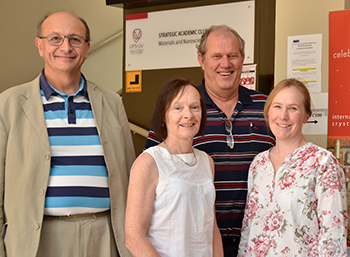Latest News Archive
Please select Category, Year, and then Month to display items
12 October 2020
|
Story Arina Engelbrecht
|
Photo Supplied
 Arina Engelbrecht from Organisational Development and Employee Well-being believes physical activity has a number of benefits for one’s health, including stress relief.
Arina Engelbrecht from Organisational Development and Employee Well-being believes physical activity has a number of benefits for one’s health, including stress relief.
Being physically active plays a big role in preventing the development of mental-health problems and in improving the quality of life of people experiencing mental-health problems.
Treatment for depression
Physical activity can be an alternative treatment for depression. It can be used as a stand-alone treatment or in combination with medication and/or psychological therapy. It promotes all kinds of changes in the brain, including neural growth, reduced inflammation, and new activity patterns are formed that promote feelings of calm and well-being. It releases endorphins – powerful chemicals in the brain that energise your spirit and make you feel good.
Physical activity can be very effective in relieving stress. Research in adults has found that physically active individuals tend to have lower stress levels compared to individuals who are less active. It also leads to improved sleep. When a person sleeps better and feels more rested, overall quality of life improves. They cope better with daily life stressors.
Reduce Alzheimer's risk
Regular physical activity can reduce your risk of developing Alzheimer's disease by up to 50%. It can also slow down further deterioration in those who have already started to develop cognitive problems. It stimulates the brain’s ability to maintain old connections as well as to make new ones.
A study asked people to rate their mood immediately after periods of physical activity (e.g. going for a walk/run, cycling, doing housework) and periods of inactivity (e.g. reading a book or watching television). Researchers found that participants felt more content, more awake, and calmer after being physically active compared to after periods of inactivity.
In conclusion, people who are physically active feel a sense of well-being, feel more energetic throughout the day, sleep better at night, have sharper memories, and feel more relaxed and positive about themselves and their lives.
“Being physically active not only changes your body, it changes your mind,
attitude, and your mood.” – Arina Engelbrecht
Prestige Scholar hosts Prof John Helliwell of Manchester University
2015-12-08

From left is Prof John R. Helliwell (School of Chemistry, University of Manchester), Dr Madeleine Helliwell (School of Chemistry, University of Manchester), Prof Andre Roodt (Department of Chemistry, University of the Free State) and Dr Alice Brink (Department of Chemistry, University of the Free State).
Photo: Steven Collett |
At the invitation of Dr Alice Brink of the Department of Chemistry, Prof John Helliwell, the 2015 Max Perutz Prize winner, and his wife, Dr Madeleine Helliwell, visited the University of the Free State (UFS).
The Helliwells, both chemists of note, took part in a series of lectures and exchanges on the Bloemfontein and Qwaqwa Campuses.
This visit from 9-19 November 2015 was the consequence of Dr Brink’s participation in the Vice-Chancellor’s Prestige Scholars Programme (PSP) initiative to encourage the broadening of the international footprint of the next generation of scholars in the academy.
Two year collaboration
Dr Brink and Prof Helliwell from Manchester University have a standing collaboration going back two years. Dr Brink, an NRF Thuthuka grant holder and a member of the PSP since 2013, has spent almost eight months in Manchester, collaborating with Prof Helliwell on her study of the successful interaction of rhenium tricarbonyl complexes with proteins determined via protein crystallography.
Their collaboration resulted from the close association of Prof Helliwell and Prof Andre Roodt from the UFS Department of Chemistry, both former presidents of the European Crystallographic Association.
Sharing academic expertise
Prof Helliwell, the 2014 American Crystallographic Association Patterson Award winner for his “pioneering contributions to the global development of the instrumentation, methods and applications of synchrotron radiation in macromolecular crystallography”, gave three lectures in the Department of Chemistry, two on the Boemfontein Campus, and the other on the Qwaqwa Campus on 13 November 2015.
Dr Helliwell, former co-editor of the Acta Crystallographica Section C: Crystal Structure Communications journal, consulted with postgraduate students from the Departments of Chemistry and Biochemistry.